I want to store an object using EF Core on a SQL Database hosted in Azure. The code works fine on the dev DB of version Microsoft SQL Server 2019 (RTM) - 15.0.2000.5 (X64). The same code throws an error on the Azure hosted SQL DB of Version Microsoft SQL Azure (RTM) - 12.0.2000.8
The first error message is
The conversion of a datetime2 data type to a datetime data type resulted in an out-of-range value.
I tried to fix it by forcing the datetype on the column DateTime like this
protected override void OnModelCreating(ModelBuilder modelBuilder)
{
var edoProp = modelBuilder.Entity<TEingangsrechnungsdokumente>();
edoProp.Property(x => x.DAngelegtAm).HasColumnType("DateTime");
edoProp.Property(x => x.DLetzteAenderungAm).HasColumnType("DateTime");
}
After adding this code, the error message now read
SqlTypeException: SqlDateTime overflow. Must be between 1/1/1753 12:00:00 AM and 12/31/9999 11:59:59 PM.
All DateTime Fields in the object carry values
The values are set like this:
var recordDate = System.DateTime.Now;
egrDoc.ODateitext = recordText;
egrDoc.OEingangsrechnungFK = RecordId;
egrDoc.ODateiname = Filename;
egrDoc.ODateierweiterung = System.IO.Path.GetExtension(Filename);
egrDoc.ODatei = FileBytes;
egrDoc.DAngelegtAm = recordDate;
egrDoc.DAngelegtVonFk = UserId;
egrDoc.DLetzteAenderungAm = recordDate;
egrDoc.DLetzteAenderungVonFk = UserId;
The model is defined like this
[Key]
[Column("d_EDO_ID")]
public int DEdodId { get; set; }
[Column("o_Eingangsrechnung_FK")]
public int OEingangsrechnungFK { get; set; }
[Column("o_Dateiname")]
public string ODateiname { get; set; } = null!;
[Column("o_Dateierweiterung")]
public string ODateierweiterung { get; set; } = null!;
[Column("o_Datei")]
public byte[] ODatei { get; set; } = null!;
[Column("o_Dateitext")]
public string ODateitext { get; set; } = null!;
[Column("d_AngelegtAm")]
public DateTime DAngelegtAm { get; set; }
[Column("d_AngelegtVon_FK")]
public int DAngelegtVonFk { get; set; }
[Column( "d_LetzteAenderungAm")]
public DateTime DLetzteAenderungAm { get; set; }
[Column("d_LetzteAenderungVon_FK")]
public int DLetzteAenderungVonFk { get; set; }
Edit:
The datatype cannot be changed to DateTime2.
The Question does not answer the question.
The database on the local machine in a restore of the azure database.
